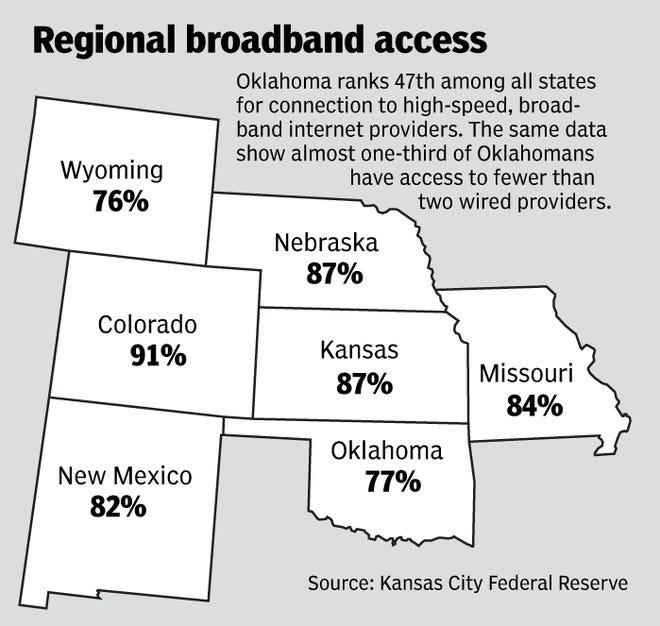
A new study by the Fiber Broadband Association reaffirmed what some Oklahoma leaders have known for years—the growing importance and dependency on an expanded and improved broadband service in the country.
Broadband funding improvements have been in the sights of Oklahoma’s congressmen Frank Lucas and Markwayne Mullin. They have long complained that residents in their mostly-rural areas of Oklahoma desperately need better access to the Internet. More funding of broadband services in the state also applies to hospitals and schools and government entities.
The report, “The Status of U.S. Broadband and the Impact of Fiber Broadband” concluded that 2022 has become a pivotal year for the advancement of fiber broadband in North America. The pandemic made it even more so.
Internet use is growing across the nation’s rural stretches. The study found however that there is also a growing digital divide largely affected by income.
“Rural versus urban/suburban differences are especially pronounced,” concluded the study.
The study focused on Digital Equity, Performance, Economic Impact, Sustainability and Quality of Life/Personal Productivity.
The following are some key takeaways from the study findings in each of those areas:
Digital Equity
• Low Income = Lowest Broadband Speeds
• Lowest density zip codes have service levels with 1/3 the bandwidth of high-density areas
• 58% of broadband adopters in the past 4 years are low income
• 37% of broadband adopters in the past 4 years are non-white households
Performance
• Average broadband speeds are 121 Mbps (D/L) /26 Mbps (U/L)
• Fiber has 45% faster download and 4.7x faster upload speeds than Cable
• Fiber has reduced the cost per bit by 90% over the past decade
• In-Home Experience
o Wired/Ethernet to PC has average speeds of 338 Mbps
o Wi-Fi Mesh has average speeds of 249 Mbps
• Fiber has half the latency of Cable
• Fiber is superior in low jitter
• Fiber providers Net Promoter Scores are significantly better
Sustainability
• Fiber has 40% less carbon footprint of Cable
Economic Impact
• 47% of Rural moves are to areas with Fiber
Quality of Life / Personal Productivity
• 72% of consumers rank broadband as very important
• Fiber broadband is important for Work-From-Home
• Broadband is a top 3 attribute for selecting a community (in addition to safe streets / low crime
and affordable living)
• More Work-From-Home employees use Fiber than other options
• More Fiber Work-From-Home employees are in the Tech industry
• More occasional Work-From-Home employees use Fiber
• Fiber-based Home Businesses have higher revenue
• Homes with Fiber have better access to Health Care
• Homes with Fiber have better access to Education
Click below to review the study
file:///C:/Users/User/Downloads/FBARVAComphrensiveBroadbandReview220723F.pdf




